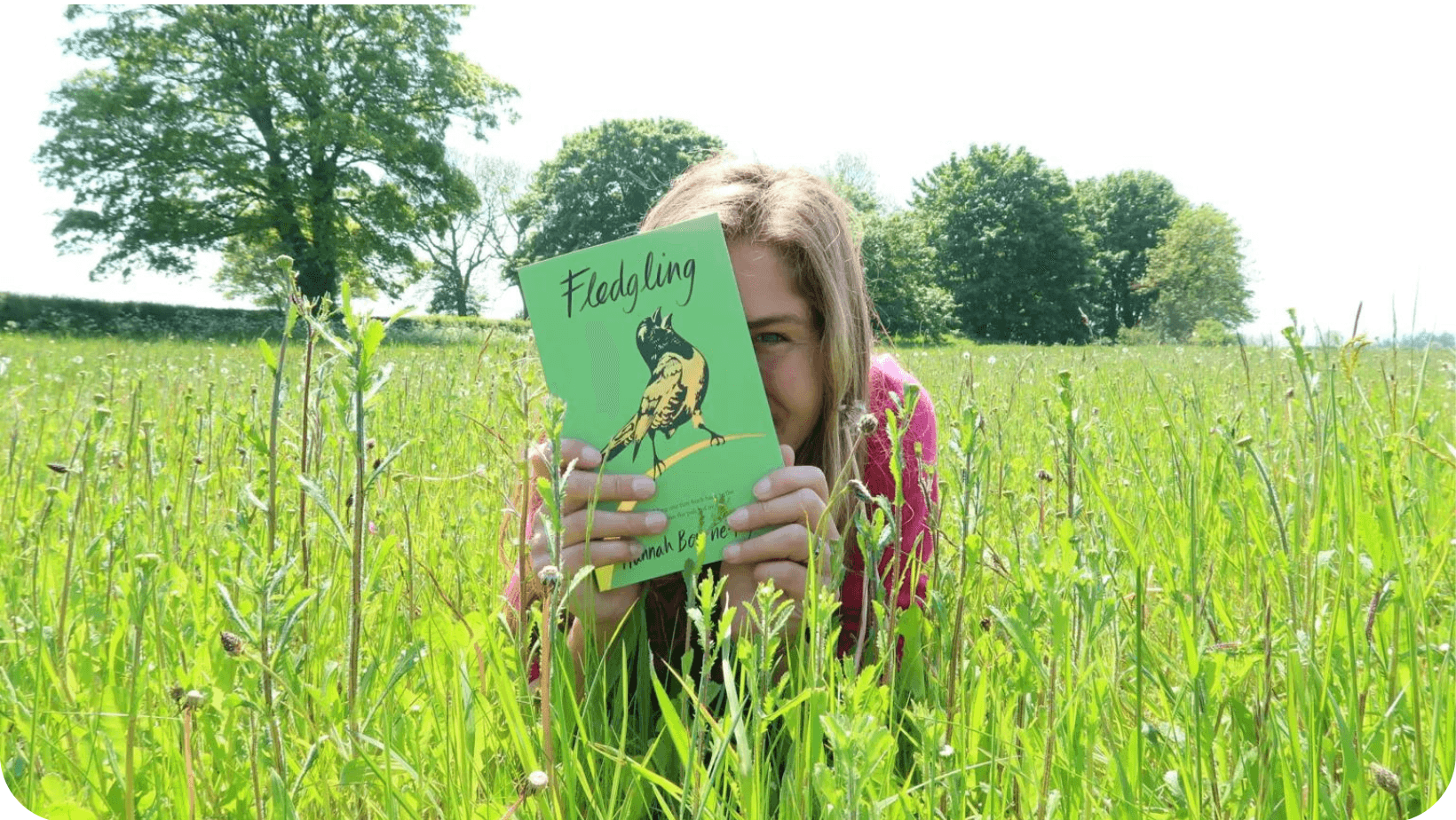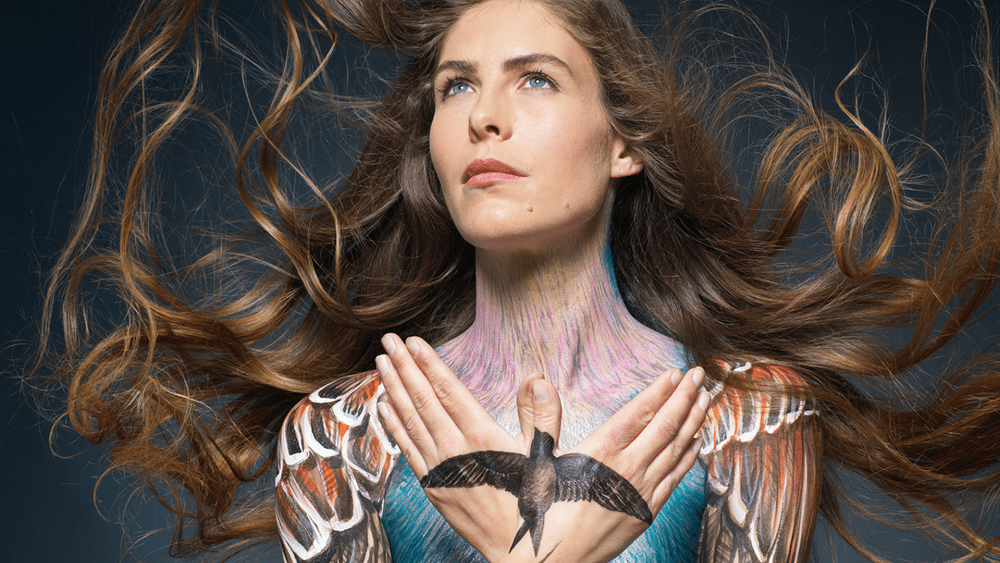Hannah Bourne-Taylor on how we can help UK birds with swift bricks
One of the first sounds many of us wake to each morning is birdsong. The beautiful symphonies of native birds chirping and tweeting away animatedly into the crisp morning air. And yet, sadly, each year, UK bird population numbers plummet, due mostly to human activity such as housing development, harmful farming practices and habitat loss, but in part also, to human in-activity. The thought of waking to a morning without birdsong is a very saddening thought to comprehend, but one that is becoming increasingly probable, unless we come together to help our feathered friends.
One human who refuses to be inactive when it comes to protecting birds is inspirational author and activist, Hannah Bourne-Taylor. Supported by the RSPB and Rewriting Extinction, on 5th November 2022, Hannah launched The Feather Speech, a national campaign for swifts, whilst painted from neck to toe in feathers.
The campaign addresses the need for urgent action to help our closest wild neighbours: red-listed cavity nesting birds. At the core of this six-month campaign, is a petition asking for swift bricks to be made compulsory across new housing in Britain. This measure would help not just swifts, but three other red-listed birds: house sparrows, house martins and starlings. The petition needs 100,000 signatures to reach parliamentary debate and the deadline is 30th April 2023.
We sat down with Hannah to hear more about this inspirational and impactful act of activism.
V-Land UK (V-L): What was the motivation for you to stand up and give The Feather Speech clad purely in painted feathers in Hyde Park?
Hannah Bourne-Taylor (HB-T): I can’t imagine my life without birds. Cemented by rescuing, hand raising and releasing two wild birds (a swift, and a finch) who are immortalised in my nature memoir Fledgling. By spending time with two individual birds, I realised first-hand that every bird is unique, and when swifts were added to the red list of highest conservation concern in 2021, meaning they face national extinction, I decided to act.
Not only are swifts awe-inspiring birds, spending more time airborne than any other bird on Earth, flying from our houses to Africa and back without landing, living for 20 years - meaning in their lifetime they will each cross the Sahara 40 times.
Adults return to the exact hole each year and those holes are getting inadvertently blocked up by human development. I wanted to be their voice, and to remind people we can work together to support nature on our doorsteps. I’ve felt so overwhelmed and helpless by the environmental crisis, and eco-anxiety skyrocketed during last summer’s heatwave, but I suddenly realised I could do something. I could try. So I did.
V-L: What was the reaction from the public on the day, and since the speech?
HB-T: It’s been mixed. The way I saw it, getting 100,000 signatures in just six months was a huge task and without being famous, I felt like I had two options that might spark a national conversation: breaking the law or getting my kit off. It’s as bleak and as simple as that. So what I did has been seen as either brave, or stupid, and certainly radical.
Not wanting to be disruptive, I collaborated with leading scientists and world-renowned artists, inspired by the co-founding women of the RSPB who had marched in London in their thirty-year battle against the plumage trade, and of course, inspired by Lady Godiva because my waist-long hair meant I could effectively copy her.
The ‘stunt’ worked - it got national attention but with this territory comes a lot of opinions. The online trolling has been fairly severe. I’ve been called everything from a bloke and transgender because of my physical appearance, to being attacked for my choices such as being labelled a mentally damaged narcissist. However, I have also had a huge amount of support, joyously quantified in the form of over 60,000 people signing the petition. Imagine a stadium full of bird lovers - it’s enough to keep me motivated, and I think many people have been fuelled, as I am, by the campaign’s motto Passion is a Superpower.
V-L: Habitat loss has been a major driving force in the population decline of birds across the globe. How urgent is the need to help our feathered friends? And how can our readers get involved?
HB-T: There are many factors in the decline of any species. For insect-eating birds such as swifts and house martins, the plummeting insect population is dire. But that is harder to solve than the other problem that hinders them. When it comes to cavity nesting birds - those who nest in holes in our walls, we all need - and can, act. The government’s Eco+ scheme for wall and roof insulation is blocking precious holes at an unprecedented rate - so far over 4 million homes across Britain. Now four cavity nesting birds (house sparrows, house martins, common starlings and common swifts) face national extinction.
And because they are our neighbours, each one of us can help by protecting our own walls, if house improvements are necessary there are working compromises, but often the problem comes from people not knowing the birds are there in the first place. Especially since swifts only live in the UK between May and August, often returning the following spring only to find their home blocked off, fatally breaking their wings in a desperate bid to get in.
We can also change legislation to make sure swift bricks are installed in new housing across the country, which would provide a legacy for them as well as us. After all, the humble house sparrow has lived alongside us since caveman days, a symbol of love in Greek mythology while swifts are part of the most ancient order of birds, existing for 70 million years, now on the brink of extinction because of us.
Britain is behind the curve when it comes to supporting these birds. The Netherlands has a mitigation measure in place for any existing nesting sites being lost, and other countries are installing the swift bricks that I am campaigning for in this country. It’s just a normal brick that sits flush to a house but with a cavity inside it providing homes for all four species. It’s not part of the new Biodiversity Net Gains measure in new developments, which means there is even more of a chance these already endangered birds will continue to be forgotten.
The Feather Speech petition closes on 30th April, and it needs 100,000 signatures to get considered for parliamentary debate. There are politicians including the immense Caroline Lucas on stand-by but those signatures are urgently needed. Any Brit of any age can sign the petition and two signatures can be allocated to any one email address. My goal is that by the time the swifts arrive (on average returning on 8th May) I can tell them that we have done all we can and we have got that 100,000 signatures on their behalf.

Hannah Bourne-Taylor
V-L: Your passion for birds is both moving and inspirational, tell us about your debut Fledgling.
HB-T: Fledgling tells the emotional rollercoaster story of how when I was 26 I moved from central London to Ghana because my husband got a job there. I was only allowed to be a resident there to support him, and not allowed to work. As a ‘trailing spouse’ I struggled to adapt. In the end, we lived in Ghana for eight years, and five of those years were spent in the rural grasslands. It was the birds that gave me a sense of belonging, shifted my perspective and through the rescuing and hand raising of two fledglings, completely changed my life.
The finch went globally viral on the book’s publication last spring, because of the national headline I let a baby bird nest in my hair for 84 days, and of course, the swift inspired me to campaign for its kind on a national level. I spent three months with the finch, a tiny bird half the size of a sparrow, spending two months walking in the grassland stalking his family so he could learn how to be wild. The boundaries between me and him, between human and wild, shrunk so there were none.
It feels natural to me to want to do everything I can to protect the resilient, incredible, sometimes goofy, and immeasurably precious, natural world, and all the creatures within it.
Fledgling is out in paperback in March. It is the forerunner of The Feather Speech, because not only does it show the depth of my connection with birds, but I also wrote it in the hope that readers would fall for the finch and let him sit on their shoulder, to remind them of the voices of the wild.
V-L: You recently decided to transition from a vegetarian diet to plant-based, what prompted the change and do you have any tips to share with V-Landers?
HB-T: I’m anaemic so diet has always been fairly tricky. For me, my choice is mostly based on knowing individual animals (wild and tame) enough to not want to be part of their suffering. This was cemented from a livestock point of view in Ghana where cruelty is visible on a daily basis. Half a dozen large Sanga cattle being loaded into trucks and driven hours to slaughter for example.
On the environmental side, I find it more complicated - of course the facts surrounding cattle ranching in particular, illustrate the hugely negative impact animal agriculture has on our climate and biodiversity. Over the last year, I’ve also investigated the agricultural chemicals that are used on plant-based crops, and am horrified by the consequences this is having on wildlife, including the creatures on our doorsteps: 12 of the 17 farmland birds in this country have lost up to 97% of their population due to intensified farming practices.
So where I can, I am eating local, chemical-free produce, which means a lot of baking bread and looking forward to growing lettuce and courgettes over the summer. I don’t find the concept of plant-based meat appetising, but a great friend of mine, Andy Shovel, is the co-founder of the brand This, which has been a bit of a crutch. I’ve become partial to the brand Plant Menu because there is a particular joy, now guilt-free, of being able to scoff junk food like (fake) chicken nuggets sometimes.
We all love a ch*cken nugget! We are moved and empowered by your determination and passion to help save these inspirational native birds. If you haven’t done so yet, please do sign the petition, and share far and wide. For more ways to help UK birds, participate in no mow may and check out the biodiversity crisis nobody is talking about.
